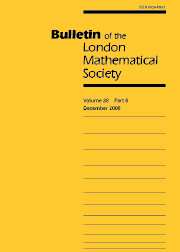Article contents
ERIC CHARLES MILNER
Published online by Cambridge University Press: 01 January 2000
Abstract
Eric Charles Milner was born on 17 May 1928 and brought up in London. His father was an engineer, but times were hard and work was often difficult to obtain. So his mother had to help out by working as a seamstress, and Eric was often looked after by his grandmother. At the age of 11, he won a scholarship to the Haberdashers' Aske's Boys' School, but never attended it in its permanent London buildings because the outbreak of the Second World War caused all London schools and their pupils to be evacuated to safer parts of the country. As a result, Eric, an only child and knowing none of his new schoolfellows, was billeted at a home near Reading where he was extremely unhappy. In despair, he ran away and returned to London, where, after unsuccessful attempts to find him another billet, he roamed the streets and missed school. After some time, he was eventually found another billet where he received kindness and was much happier. Despite these disruptions and the other inevitable shortcomings of a war-time education, Eric's intelligence more than sufficed to surmount such hurdles, and in later life he could speak and write better than most of us.
From 1946 to 1951, Eric attended King's College, London. He graduated with First Class Honours in 1949, when he was awarded the Drew Gold Medal as the most distinguished Mathematics student in that year, and a Research Studentship. He then studied for an MSc degree, taking ‘Modern algebra’ and ‘Quantum mechanics (Wave mechanics)’ as his selected subjects, his supervisors being Richard Rado (then a Reader at King's College) and Professor Charles Coulson. He received the MSc degree, with distinction, in 1950. This was followed by a year's research in quantum mechanics under the supervision of Professor Coulson.
- Type
- OBITUARY
- Information
- Copyright
- © The London Mathematical Society 2000
- 1
- Cited by


